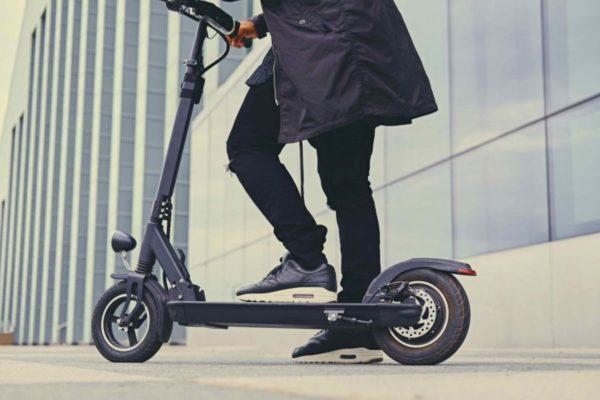By Doug McClellan
BOULDER, Colo. (BRAIN) — Cycling advocates are casting a wary eye on bills pending in several statehouses that seek to legalize electric scooters. Their concerns aren’t with e-scooters as such, but with the scooter industry’s attempts to classify them as legally identical to bikes or electric bikes.
The scooter industry’s growth, and its much publicized disputes with local officials, has led to a glut of bills across the country. Legislatures in more than half the states are considering scooter-related bills this year. The bills that redefine scooters as bikes are the most troublesome for bike advocates.
“I really don’t want a scooter-related bill that defines scooters as bikes to get passed, and then have that bill reopened down the road because there are issues and safety implications with scooters,” said Morgan Lommele, director of state and local policy for PeopleForBikes and for the Bicycle Product Suppliers Association.
Bikes and electric scooters share many common interests, and both are seen as viable ways to reduce car traffic and make cities more livable and environmentally friendly. Some electric scooter-sharing companies also run bike-share systems and are members of the PeopleForBikes Coalition.
“I think there is an existential crisis for the industry as to who we are,” — Randy Neufeld, director of the SRAM Cycling Fund
But cycling advocates worry that safety issues or other problems with scooters could disrupt the bike industry’s success in legalizing e-bikes. PFB and the BPSA have been chipping away at passing model e-bike bills in state legislatures. The model bill creates three classifications for e-bikes, and the industry has gotten the bill, or something close to it, passed in 14 states so far.
Lommele said she is tracking 41 scooter bills pending in 27 states. The measures seek to provide a legal footing for scooters and scooter-share services.
While legalizing and regulating scooters is fine with the bike industry, Lommele said the industry objects to giving scooters legal parity with bikes, or treating bike-share and e-bike-share systems the same as scooter-sharing systems.
She cited one problematic scooter-sharing bill that is pending in the California Assembly. One provision of AB-1286 would require the operator of a scooter- or bike-share system to maintain general liability insurance. That would eliminate the common practice among bike-share operators of requiring users to sign waivers before they hop on a share bike.
“It implicates bikes and it lumps in bike share with scooter share. It takes away the ability to require a waiver from the rider. That’s really unfair to nonprofit bike-share operators,” Lommele said. “What scooters do should be specific to their industry and to their share operations, and not rope in bike share.”
In January, a Florida state senator introduced SB 542, which Lommele says lumps “motorized bicycles” in the same category as “micromobility devices” for the purpose of regulating electric scooter-share systems.
“We want them to remove ‘motorized bicycles’ from that definition to avoid any negative consequences for electric-bike-share operators in the state,” Lommele said.
In Tennessee, HB 1220 would establish requirements for electric scooters that mirror those for e-bikes, according to a legislative analysis.
Randy Neufeld, director of the SRAM Cycling Fund, believes e-scooters and similar light electric vehicles present a long-term threat to the bike industry.
“I think there is an existential crisis for the industry as to who we are,” he said.
It’s a tricky argument, because Neufeld acknowledges that scooters and other LEVs are much better for cities than cars. But he argues that they aren’t as beneficial for society as the human-powered activities of walking or riding a bike or e-bike.
“If, policywise, these light, low-speed vehicles occupy the bicycle ‘space’ — no helmet, no insurance, no license, you can park them anywhere — then they become a competitor to our industry,” Neufeld said. “It’s not that they’re bad things, but if they’re easier and cheaper and more available then it’s difficult for us to compete.”
The threat to e-bikes is particularly worrisome, he said, because e-bikes are key to the bicycle industry’s future profitability and growth.
“The light low-speed vehicles are likely to get cheaper and cheaper. We could be having a $2,000 e-bike competing with a $200 light low-speed electric vehicle,” he said.
The North American BikeShare Association, which despite its name now represents shared scooter and other “micromobility” devices as well as the bike-share industry, argues that bike-share and scooter-sharing systems should be treated separately.
In a policy statement, NABSA says bike lanes and other protected cycling infrastructure are the “most sensible” places for electric scooters. But the organization also says that “bicycles, electric bicycles and electric scooters are different products and should be regulated differently as appropriate. In particular, NABSA supports language that defines electric scooters independently of regulations regarding bicycles and electric bicycles.”
When comes to lobbying against these bills, the bike industry has another problem: The booming scooter industry has far deeper pockets.
“These are massive, multibillion-dollar operations, heavily backed by venture capital, and they’re aggressively seeking market share,” PFB’s Lommele said. “It’s just a different environment than bikes and e-bikes.”
Lyft, the ride-share company, owns Motivate, the largest operator of bike-share systems in the United States, and also operates a network of dockless scooters. It was anticipated to be valued at more than $20 billion in its IPO, which was expected to happen before the end of March.
Lime and Bird, two other big scooter-share firms, are each worth about $2 billion. Uber, the big kahuna of ride-sharing firms, is an investor in Lime and owns e-bike-share provider Jump Bikes, which recently debuted scooter services in several cities.
Editor’s note: A version of this article ran in the April 1 edition of BRAIN.
To read more about e-scooters we recommend you to read this: Why are bike share companies pivoting to e-scooters?
